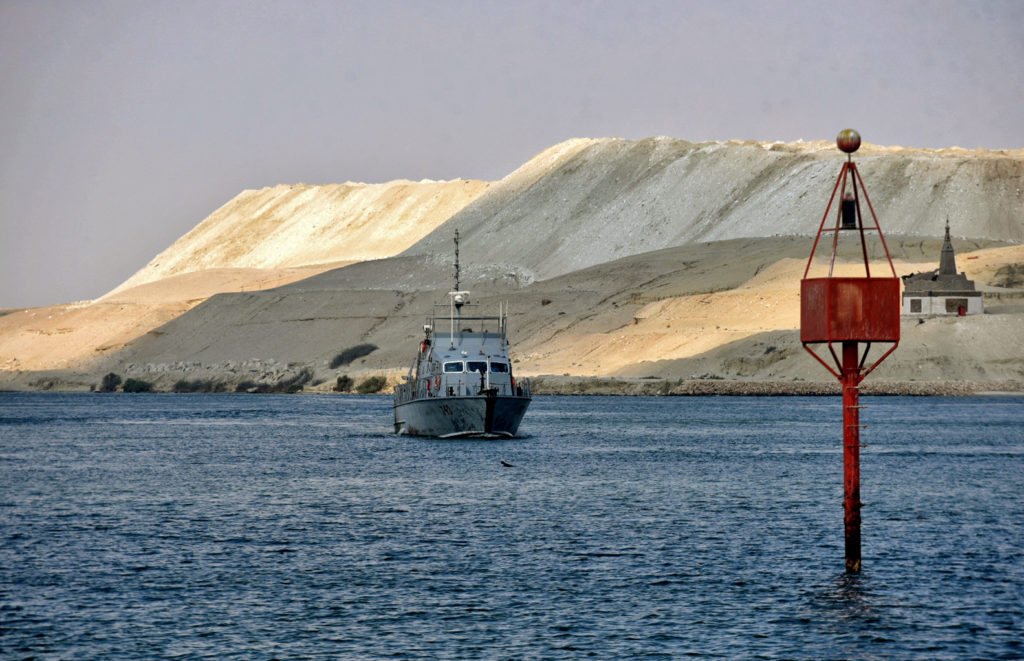São Paulo – Egypt’s Suez Canal blockage due to a stranded ship is expected to reflect on Brazil-Arab trade. The Canal is a shipping route between Brazil and Arab countries such as the United Arab Emirates, Saudi Arabia, Qatar, Bahrain, Kuwait, Oman, and Yemen. Pictured above, traffic in Suez canal resumed one day after it was cleared.
Although it took place near a special period for the Arab markets, the Ramadan, the impact is not expected to go far beyond the unloading of goods. “In the short term, it can impact the delivery of goods for Ramadan, but I don’t believe it will take more than three weeks to go back to normal,” Arab Brazilian Chamber of Commerce (ABCC) secretary-general Tamer Mansour says.

This year’s Ramadan starts on April 13 and ends on May 12. During the period, Muslims fast during the day but prepare full tables as soon as the sun sets. The Arab countries usually maintain a well-supplied food stocks for the period, and Brazil is a major supplier for them.
The Suez Canal is not a shipping route between Brazil and all Arab countries as most of the Arab nations in Africa are located before the canal. Goods bound to Egypt itself are unloaded prior to the Canal. “Ships from Brazil to Egypt cross the Mediterranean Sea and dock before the Suez Canal, usually using the Alexandria Port and Port Said,” explained Brazil’s agricultural attaché in Egypt, Cesar Simas Teles.
Teles adds the situation is different for shipments from Brazil to other Arab countries, tough. “The Canal blockage could impact Brazilian trade with other Arab countries as the crossing is the shortest shipping route between Brazil and some Arab trade partners. Without the Canal, ships would take up to two more weeks to complete the same journey,” he told ANBA.

O
Project and business development manager at Unimar shipping agency, Pedro Oliveira says Brazilian bulk cargos that are bound to the Arab Gulf countries usually don’t go through the Suez Canal but sail around the Cape of Good Hope in South Africa to reach the destination ports, so they are not affected by the Suez Canal blockage. As for the container ships from Brazil to the region, they are transshipped in Mediterranean and North European ports, which were congested due to Suez.
The cargos are put on other ships as there isn’t a back-and-forth flow of containers between Brazil and the Arab countries that could justify a direct shipping lane. Last year Brazil shipped 188,000 20-feet containers (TEUs) to the Arab market and imported 24,000 TEUs, Oliveira said.
Despite the temporary Suez Canal obstruction, Unimar’s executive says the shipowners didn’t curb container shipments from Brazil to the Arab countries. “The shipowners are seeking alternatives in services that go around the Cape of Good Hope in South Africa and are warning their customers that some connections could be delayed for a week at least,” he says.
Repercussions

When the Suez Canal was cleared, over 400 ships were waiting to go through the waterway. Oliveira believes the delays in deliveries caused by the Canal blockage could affect import licenses in more time-sensitive goods and the situation could also impact ship costs with an increase in prices for the service as well as the container availability.
Teles forecasts repercussions in meat sales from Brazil. “Meat sales to the Arab countries could be impacted by the delay in shipments due to the increased shipping costs and specially the difficulty in obtaining refrigerated containers. As the availability of refrigerated containers had already been impacted by the effects of the COVID-19 pandemic, the Suez Canal blockage could worse this situation,” the agricultural attaché said.
Find out more on the Suez Canal and Egypt:
All of them are unanimous in saying that most goods Brazil ships to the Arab countries are not time sensitive, so product losses within ships are not expected. Frozen meats, if kept under refrigeration, are valid for more than three months. “In this regard, the Egyptian government has showed a great concern on living animal cargos by mobilizing veterinaries and supplying fodder for the vessels that were trapped during the Canal blockage,” said Teles.
Around 12% of the global trade goes through the Suez Canal. This accounts for over 1 billion tonnes in goods a year, worth USD 1 trillion. The Canal is the shortest sea route between Europe and Asia. The ABCC’s secretary-general points out that Suez is also a major source of revenue for Egypt. “If the crisis was to be extended, it could impact the country’s economy,” says Mansour. The Canal fetched USD 5.6 billion in revenue for the Arab country in 2020.
Translated by Guilherme Miranda




